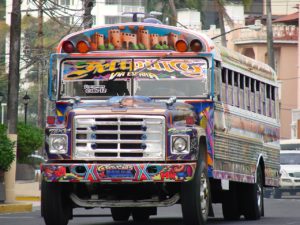Media bus Digit:Alle
A mobile media skills center for people with cognitive disabilities
Phase 2
Type of project: Prototype
Disability concerned: Autism and Pervasive Developmental Disorders, Mental disability
Topics: Digital accessibility, Autonomy, Education, Participation in cultural life, sports and leisure activities, Services and communication
Status: Completed
The inclusive project team has developed a visual prototype for a mobile media skills centre (media bus) that supports people with mild cognitive impairment (PCI) in their use of media. The aim of the service is to enhance the media use and media skills of PCI and to promote their social participation, involvement and self-determination through connection to digital media.
Digital media have expanded the opportunities for participation and involvement for people with mild cognitive impairment (PCI) (Bosse et al. 2016; Luginbühl et al. 2019; Münch et al. 2022; Reber et al. 2016; Bonilla-del-Rio et al. 2022; Verdegem 2011). However, they often lack access and appropriate support. There are many reasons for this: culturally pessimistic attitudes, lack of skills among reference persons, fear of negative consequences, etc. As part of the exploratory study, the idea of a media bus as a mobile media skills centre was developed as part of a co-creation approach based on knowledge of how PCIs use the media. The aim of the service is to provide PCI with access to digital applications in a fun, low-impediment way, and to reinforce their use of the media. During the prototyping phase, the inclusive research team developed the idea for the bus. The target group should be able to try it out in the form of a communicative prototype (leporello). The prototype enabled the offer to be tested with the partner in the field in terms of needs, attractiveness and understanding.
The results of the prototyping phase were used to define 5 process stages for the operation and to visualise them in the form of a customer journey.
It is vital for the offer to be individually tailored to the needs of the institution. To ensure that the offers have a lasting effect, an inclusive team of coaches is formed within the institution. Its members are trained beforehand and continue to offer their support after the bus has left.
There are 3 main themes: 1) safety in everyday digital life, 2) the creation of creative media content, and 3) the fun discovery of new applications and devices. The institution/self-representatives choose the strong points. This fosters self-determination and digital competence, enabling social participation and access in everyday life.
The feasibility study (development of a business model), which has yet to be completed, should lay the foundations for implementation.
The project has been divided into several stages and has been designed to be inclusive and participative at every stage: Preparation (findings of the exploratory study, research into related projects, interviews), co-creation workshop to make the offer more concrete, development of the 1st prototype, including a workshop to test the prototype, development of the 2nd prototype, testing of the 2nd prototype within the inclusive research team.
Within the transdisciplinary and inclusive team, the different skills (e.g. technical expertise, workshop methodology, networking, communication) were able to be integrated to good effect. The co-creation workshop to develop the offer was particularly interesting in terms of broadening methodological knowledge. It turned out that the personas methodology was suitable as an inclusive workshop format, the processes having been adapted slightly (complexity, time, canvas). In addition, the prototype and visualisation helped to make the offer and the operating process comprehensible to everyone.
As part of a feasibility study, a business model is to be developed for the media bus as a mobile media competence centre. Interviews with operators of comparable services will form the basis for developing the business model. At the same time, discussions will be held with potential cooperation partners, potential operators and employees. In addition, applications for support for the implementation phase will be drawn up and submitted. The aim is to move on from the feasibility study to project implementation, using the foundations developed as part of the Innovation Booster project. Particular attention will also be paid to subsequent exploitation.

